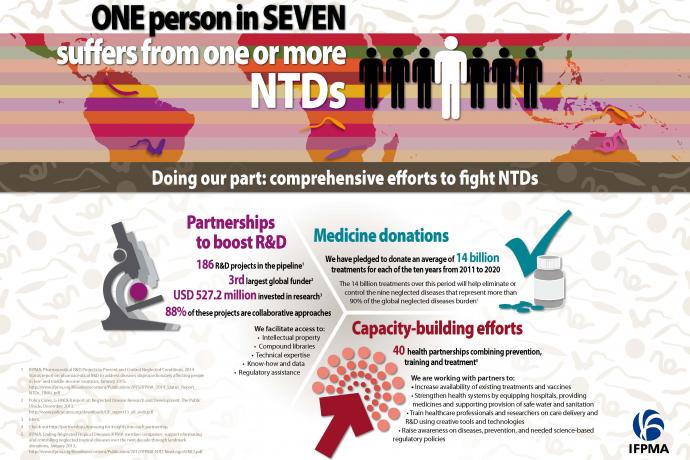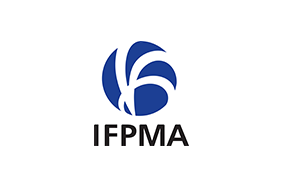Pharmaceutical Industry Makes Progress in Cutting-Edge R&D for Neglected Disease
Published 02-19-15
Submitted by International Federation of Pharmaceutical Manufacturers & Associations
 Doing our part: Comprehensive efforts to fight NTDs
Doing our part: Comprehensive efforts to fight NTDsThe International Federation of Pharmaceutical Manufacturers & Associations (IFPMA) released today the 2014 Status Report on pharmaceutical R&D projects to address neglected diseases. The report lists 186 R&D projects supported by IFPMA members to develop new or improved medicines and vaccines for 11 neglected conditions1 that each year kill or disable millions of people in low- and middle-income countries. Of the 186 treatments or vaccines R&D projects, 28 are undergoing early stage clinical trials, while 10 currently go through the final stages of demonstrating their efficacy, quality, and safety.
The ten more imminent breakthroughs concern TB (3 projects), malaria (5 projects), dengue (1 project), and intestinal worms (1 project), nearing the end of what is on average a 10 to 15 years R&D process.
Vaccines R&D projects have tripled in the last ten years and the pipeline now holds one promising vaccine for malaria (currently under evaluation at the European Medicines Agency), one for dengue (phase III), for which at present no therapy exists, as well as three fast-tracked vaccines for Ebola (phase I/II).
164 (88%) R&D projects for neglected diseases are collaborative efforts, involving partnerships between IFPMA member companies and more than 80 partners from universities, public and private sector institutes and non-governmental organizations.
IFPMA member companies are also involved in over 40 partnerships2 to support capacity-strengthening the projects that aim to bolster local health systems and capacity, as well as provide safe water and sanitation, and public awareness on disease prevention.
Adding to these efforts, the pharmaceutical industry continues to deliver on its 20123 pledge of 1.4 billion annual treatments through 2020 to control or eliminate the nine neglected diseases responsible for more than 90% of the global neglected diseases burden. These donations support WHO’s mass drug administration programs for neglected diseases.
Full Status Report is available here, and infographic here.
1Tuberculosis, malaria, human African trypanosomiasis (sleeping sickness), leishmaniasis, dengue, onchocerciasis (river blindness), American trypanosomiasis (Chagas disease), schistosomiasis, lymphatic filariasis, soil-transmitted helminthic diseases and Ebola.
2Check out http://partnerships.ifpma.org for insights into each partnership.
3London Declaration on Neglected Tropical Diseases.
About IFPMA:
IFPMA represents research-based pharmaceutical companies and associations across the globe. The research-based pharmaceutical industry’s 2 million employees research, develop and provide medicines and vaccines that improve the life of patients worldwide. Based in Geneva, IFPMA has official relations with the United Nations and contributes industry expertise to help the global health community find solutions that improve global health.

International Federation of Pharmaceutical Manufacturers & Associations
International Federation of Pharmaceutical Manufacturers & Associations
The International Federation of Pharmaceutical Manufacturers & Associations (IFPMA) represents research-based pharmaceutical companies and associations across the globe. Based in Geneva, IFPMA has official relations with the United Nations and contributes industry expertise to help the global health community find solutions that improve global health.
Research-based pharmaceutical companies make a unique contribution to global health as innovators of life-saving and life-changing medicines and vaccines, which improved millions of lives around the world. Both IFPMA and its companies are involved in hundreds of partnerships, including the Access Accelerated initiative, a partnership of over 20 biopharmaceutical companies developing innovative and sustainable solutions to improve access to non-communicable disease (NCDs) treatment and care in low- and middle income countries. Access Accelerated also partners with the World Bank and the Union of International Cancer Control to help address the full spectrum of access barriers to NCD medicines. These partnerships involve the discovery of treatments that threaten health security or unduly put a burden on low-income countries, as well as support Universal Health Coverage (UHC) by expanding access to medicines and vaccines and strengthening health systems and in doing so, contribute to the Sustainable Development Goals (SDG 3 and SDG 17).
IFPMA hosts the Secretariat of the AMR Industry Alliance, a coalition of over 100 biotechnology, diagnostic, generics and research-based biopharmaceutical companies and trade associations that was formed to drive and measure industry progress to curb antimicrobial resistance. IFPMA also played a key role in establishing the AMR Action Fund, a ground-breaking initiative involving over 20 biopharmaceutical companies, that aims to bring 2-4 new antibiotics to patients by 2030.
Other initiatives supported by IFPMA include: The African Global Health Leaders Fellowship, the Africa Young Innovators for Health Award, and Fight the Fakes.
More from International Federation of Pharmaceutical Manufacturers & Associations

